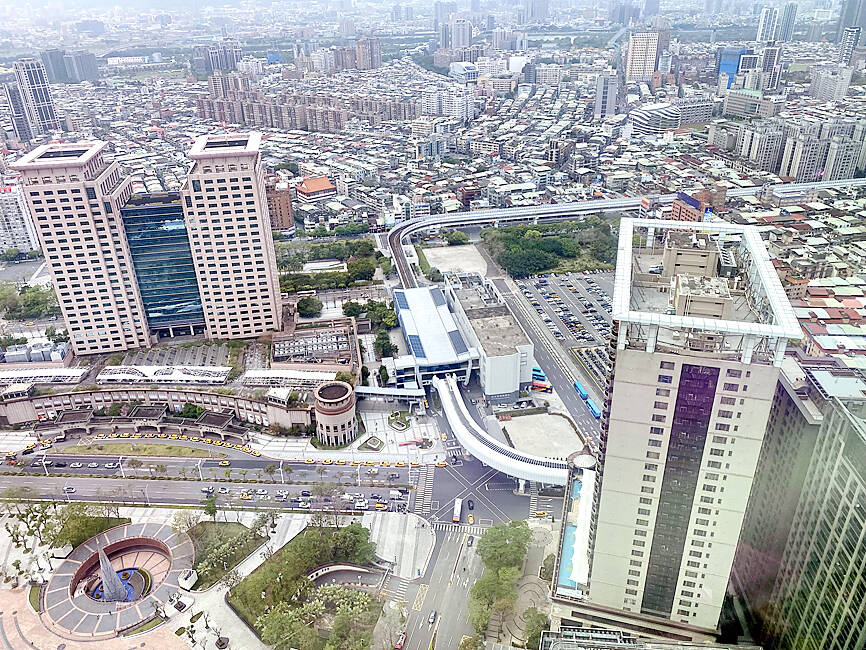Property tax revenue for last quarter declined 12 percent year-on-year to NT$6.42 billion (US$210.53 million), as economic weakness and interest rate hikes dampened buying interest, analysts said yesterday.
The retreat was in line with a slowdown in property transactions, but remained the second-highest quarter behind that of the same period a year earlier, Great Home Realty Co (大家房屋) head researcher Mandy Lang (郎美囡) said.
The extension of property taxes to presale contract transfers in July 2021 has bolstered the tax category in the past two years, Lang said.

Photo: CNA
The revisions also expanded the definition of short-term speculation from two years to five years upon resale of real estate, significantly raising the number of taxable cases, she said.
Tainan recorded the steepest decline of 33.8 percent among the six special municipalities, followed by Taipei’s 25.8 percent decrease and Taichung’s 23.8 percent reduction, she said.
However, New Taipei City, Taoyuan and Kaohsiung bucked the trend registering year-on-year property tax gains of 7.7 percent, 10.8 percent and 7.8 percent respectively, she said.
Sellers should have exited the market with small gains or without capital losses unless they bought at record-high prices, Lang said.
Housing prices have soared in Taichung, Tainan and Kaohsiung in the past few years on the back of improving infrastructure and major tech firms’ construction of new manufacturing facilities.
H&B Realty Co (住商不動產) research chief Jessica Hsu (徐佳馨) said she doubted that property tax revenue would continue to climb in the near term, with interest rates rising above 2 percent and bans on the transfer of presale home purchase agreements approaching.
Policymakers have reiterated their intent to facilitate a soft landing on high property prices and might introduce more unfavorable measures to accomplish that goal, Hsu said.
In related news, a high percentage of resold homes in the past two years were exempt from property taxes despite spikes in real-estate prices, Sinyi Realty Co (信義房屋) said.
In 2021, 54,000 resold homes, or 31.55 percent of overall deals, were exempted from property taxes, likely as they were sold due to job relocation, Sinyi Realty research manager Tseng Ching-der (曾敬德) said.
The ratio of exemptions reached 25 percent last year, which was also high in light of steep real-estate price increases in the past few years, Tseng said, citing Ministry of Finance data.

Taiwan will prioritize the development of silicon photonics by taking advantage of its strength in the semiconductor industry to build another shield to protect the local economy, National Development Council (NDC) Minister Paul Liu (劉鏡清) said yesterday. Speaking at a meeting of the legislature’s Economics Committee, Liu said Taiwan already has the artificial intelligence (AI) industry as a shield, after the semiconductor industry, to safeguard the country, and is looking at new unique fields to build more economic shields. While Taiwan will further strengthen its existing shields, over the longer term, the country is determined to focus on such potential segments as

UNCERTAINTY: Innolux activated a stringent supply chain management mechanism, as it did during the COVID-19 pandemic, to ensure optimal inventory levels for customers Flat-panel display makers AUO Corp (友達) and Innolux Corp (群創) yesterday said that about 12 to 20 percent of their display business is at risk of potential US tariffs and that they would relocate production or shipment destinations to mitigate the levies’ effects. US tariffs would have a direct impact of US$200 million on AUO’s revenue, company chairman Paul Peng (彭雙浪) told reporters on the sidelines of the Touch Taiwan trade show in Taipei yesterday. That would make up about 12 percent of the company’s overall revenue. To cope with the tariff uncertainty, AUO plans to allocate its production to manufacturing facilities in

COLLABORATION: Given Taiwan’s key position in global supply chains, the US firm is discussing strategies with local partners and clients to deal with global uncertainties Advanced Micro Devices Inc (AMD) yesterday said it is meeting with local ecosystem partners, including Taiwan Semiconductor Manufacturing Co (TSMC, 台積電), to discuss strategies, including long-term manufacturing, to navigate uncertainties such as US tariffs, as Taiwan occupies an important position in global supply chains. AMD chief executive officer Lisa Su (蘇姿丰) told reporters that Taiwan is an important part of the chip designer’s ecosystem and she is discussing with partners and customers in Taiwan to forge strong collaborations on different areas during this critical period. AMD has just become the first artificial-intelligence (AI) server chip customer of TSMC to utilize its advanced

Chizuko Kimura has become the first female sushi chef in the world to win a Michelin star, fulfilling a promise she made to her dying husband to continue his legacy. The 54-year-old Japanese chef regained the Michelin star her late husband, Shunei Kimura, won three years ago for their Sushi Shunei restaurant in Paris. For Shunei Kimura, the star was a dream come true. However, the joy was short-lived. He died from cancer just three months later in June 2022. He was 65. The following year, the restaurant in the heart of Montmartre lost its star rating. Chizuko Kimura insisted that the new star is still down